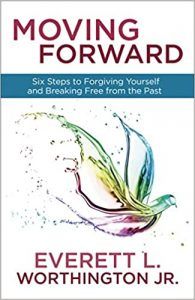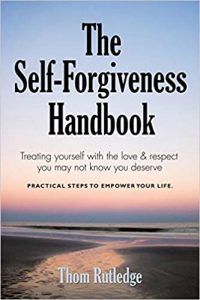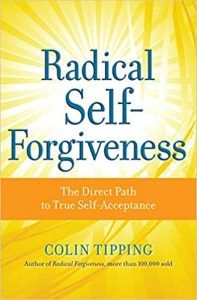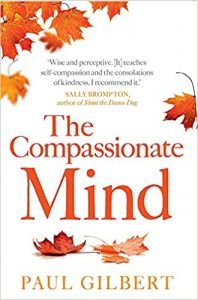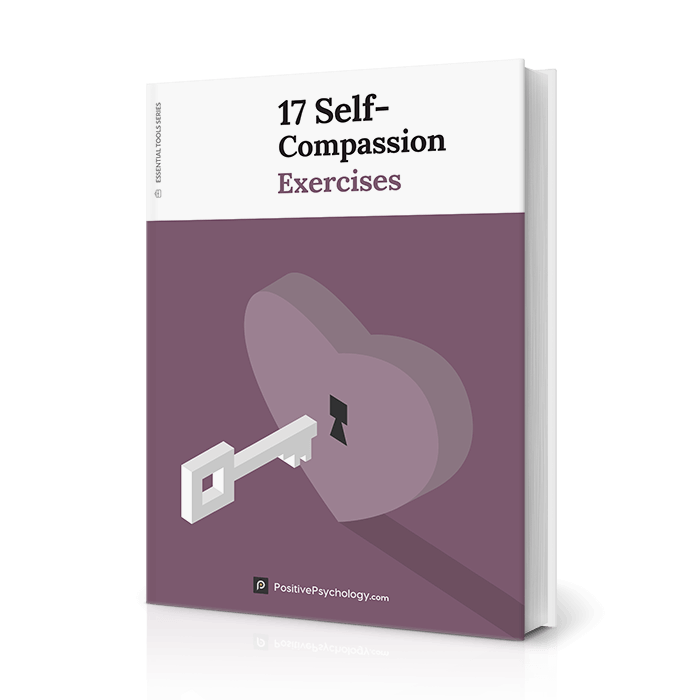Fostering Self-Forgiveness: 25 Powerful Techniques and Books
 There’s nothing quite like the ominous, stomach-churning feeling you get when you realize you’ve done something wrong.
There’s nothing quite like the ominous, stomach-churning feeling you get when you realize you’ve done something wrong.
It could be as simple as forgetting a loved one’s birthday, sending a hurtful text, cheating on a test, or lying to your partner. The reality is, we sometimes hurt people we love, make poor judgments, and do things that fall below the moral standards to which we hold ourselves.
Whatever it is, how do you forgive yourself?
When we self-forgive, we do not take the easy way out. We own our actions and gradually move to a place of self-compassion and growth. In this article, we break down the self-forgiveness process and outline steps you can take to foster self-forgiveness.
Before you continue, you might like to download our three Self-Compassion Exercises for free. These detailed, science-based exercises will not only help you increase the compassion and kindness you show yourself, but also give you the tools to help your clients, students, or employees show more compassion to themselves.
This Article Contains:
What Is Self-Forgiveness?
Self-forgiveness is not an on-off switch, but a process that happens over time through emotional work and reflection (Woodyatt, Worthington, Wenzel, & Griffin, 2017).
Self-forgiveness requires striking a balance between taking responsibility and maintaining a positive sense of self. When you successfully find this equilibrium, you reach self-forgiveness (Woodyatt et al., 2017).
In psychology, the concept of self-forgiveness is still relatively new and involves a combination of emotional, motivational, and behavioral changes (Woodyatt et al., 2017).
Enright and the Human Development Study Group (1996, p. 116) were the first to offer a concrete psychological definition of self-forgiveness as “a willingness to abandon self-resentment in the face of one’s acknowledged objective wrong, while fostering compassion, generosity, and love toward oneself.”
Enright and the Human Development Study Group (1996) highlighted three important pillars of self-forgiveness:
- The release of negative emotions directed toward the self
- The cultivation of positive emotions directed toward the self
- An acceptance of responsibility
Releasing self-directed negative emotions
When we do something bad, wrong, or against our values, we may be greeted with painful, negative emotions such as shame, guilt, resentment, or anger. We may also have negative thoughts about ourselves, such as, “It’s all my fault” or “I’m a terrible person.”
Self-forgiveness does not mean we skip the step of feeling bad; it simply means that we work through these feelings of self-resentment and then relieve ourselves of them once they’ve served their purpose (Woodyatt et al., 2017). Initially, remorseful feelings can be useful because they motivate us to make amends (Woodyatt et al., 2017).
Cultivating self-directed positive emotions
As well as putting our negative emotions in our rear-view mirror, self-forgiveness involves fostering benevolent thoughts and emotions toward the self in the form of self-compassion, love, and kindness (Woodyatt et al., 2017). Through self-compassion, we can appreciate our shared humanity and acknowledge that we are all flawed and all make mistakes.
Acknowledging and accepting responsibility
If you were to only absolve yourself of negative emotions and shower yourself with positive emotions, this would be “pseudo-self-forgiveness” (Hall & Fincham, 2005). True self-forgiveness involves recognizing the “wrongness” of your actions (Woodyatt et al., 2017).
When a person has caused harm to another, Cornish and Wade (2015) suggest that self-forgiveness should also include an other-focused component, where the person seeks to make amends with the person they’ve wronged and recommits to their values. They suggest this would make it less likely that the “offense” would happen again.
In their model, they discuss the four Rs of genuine self-forgiveness that could be applied in a counseling setting (Cornish & Wade, 2015):
- Responsibility
The person seeking forgiveness takes responsibility and does not lay blame elsewhere. - Remorse
Cornish and Wade (2015) suggest that the individual should work through difficult emotions like shame to more “offense-specific” emotions like guilt, which are more likely to motivate people to make reparations. - Restoration
The next step is to actively try to make things right, repair relationships, and reaffirm any moral values that were broken. - Renewal
This is a place of self-forgiveness, renewed self-compassion, and self-respect. Through this process, the individual achieves “moral growth.”
You might wonder about the people who have no “wrong” to take responsibility for.
As well as breaking the moral codes of our communities, we may chastise ourselves for not meeting some internal, unrealistic, or perfectionistic standard. You might beat yourself up for failing a driving test or losing a sports competition. Although you believe you’ve failed or let people down in some way, there is no ill intention, no amends to be made, and no one to apologize to.
In this case, developing a more accurate understanding of the limits of responsibility you can reasonably place on yourself could help you unburden yourself of misplaced or excessive “perceived” responsibility (Woodyatt et al., 2017).
When self-forgiveness is not the answer
When working with people to reach self-forgiveness in a counseling setting, Cornish and Wade (2015) emphasize that for some people, self-forgiveness may not be an appropriate focus for healing. For example, when working with victims of a sexual assault, taking responsibility is not warranted, and encouraging self-forgiveness could actually compound harmful feelings of self-blame (Cornish & Wade, 2015).
Additionally, someone who continues to harm another person (e.g. in the case of domestic abuse) is not fully accepting responsibility for their actions. Cornish and Wade (2015) suggest that it’s possible that relieving negative self-directed feelings through premature self-forgiveness could dull the incentive to change behavior.
How to Forgive Yourself: 8 Steps

- Working toward acknowledging responsibility
- Reaffirming your worth
To break it down, here are eight steps you can take to work toward self-forgiveness (Cornish & Wade, 2015; Griffin et al., 2017):
- Identify
Identify the events or behaviors you wish to forgive yourself for. - Explore
Explore your responsibility for what happened. To what extent were you responsible? - Accept and experience remorse
When you have acknowledged your level of responsibility, try to accept this responsibility. Remorseful or shameful feelings that arise may be difficult to sit with, so be kind to yourself in the process. - Notice thoughts and feelings
Be mindful of your thoughts and feelings and look to challenge perfectionist thinking or any unreasonable standards you’re holding yourself to. If you’re feeling guilt or shame, try to understand this in the context of this one unique event or behavior. Avoid generalizing these feelings to you as a person (i.e., focus on your actions, not your character). - Make amends
Make amends when possible with the person you harmed. If there are no amends to be made, consider whether you’re being reasonable in blaming yourself. - Recommit
Learn from the experience, and continue to make choices that are in line with your values. By recommitting to your values, you reaffirm that your principles are important to you, which can lead to personal growth. - Nurture compassion
Try to build up good feelings about yourself, and get into a more compassionate mindset. How would you speak to a friend who was going through the same thing? - Let go
Let go of any negative feelings toward yourself. Notice whether any behaviors or unhelpful thinking processes are continuing the cycle of self-punishment. You’re not pretending it didn’t happen; you’re simply acknowledging that continuing to resent yourself is no longer useful. Treat yourself with compassion, and validate your value as a person, perhaps with the use of affirmations or guided meditations.
Self-forgiveness is necessary for us to move on, learn from our mistakes, and ultimately lead a more fulfilling life. Check out this inspiring TED talk from Dr. Eileen Timmins on How Self Forgiveness Leads to Light, Love and a Joyful Life.
Compassion-Focused Therapy
For some people, self-forgiveness may feel like an insurmountable mountain to climb alone. Compassion-Focused Therapy can help people develop their ability to manage their emotions and the emotions of others (Gilbert & Woodyatt, 2017).
Some core competencies developed during Compassion-Focused Therapy include (Gilbert & Woodyatt, 2017):
- Attention sensitivity:
A state of mindfulness – looking at and being aware of the suffering of others and the negative feelings we experience as a result. - Sympathy:
The distress of others can evoke emotions within us, which can motivate us to pursue self-forgiveness. - Distress tolerance:
Tolerating difficult feelings and the negative thoughts and beliefs associated with these feelings. - Empathy:
Connecting on an emotional level with the self and others. This is fundamental to deepening an awareness of the consequences of our actions and connecting with our shared humanity. - Nonjudgment:
Letting difficult thoughts and feelings in and sitting with them, observing the experience from a compassionate perspective.
Through the sessions, the counselor encourages the client to get in touch with their “most compassionate self” and asks questions to help them understand what they need to do for themselves to reach self-forgiveness (Gilbert & Woodyatt, 2017).
20 Self-Forgiveness Affirmations
Affirmations are positive statements that can help people reconnect with a more compassionate mindset. Using them regularly can help people turn the volume down on negative self-talk and amplify more positive self-affirming thoughts.
Here are 20 self-forgiveness affirmations you could try either for yourself or in session with a client:
- I am worthy of forgiveness.
- I am human, and sometimes I make mistakes.
- I can learn from my mistakes.
- I forgive myself for what I did.
- No one is defined by one mistake or one incident.
- I can let go of feelings of guilt and shame.
- I can forgive myself, as I would forgive others.
- I deserve to treat myself with compassion and kindness.
- I love, forgive, and accept myself with all of my imperfections.
- I am worthy of others’ love and acceptance, just as I am.
- By accepting responsibility for what happened, I can achieve personal growth.
- I deserve to be able to move on with my life.
- I welcome kindness, compassion, and love into my life.
- I care about others and am accountable for my actions.
- I am wiser today than yesterday because I have learned from my mistakes.
- I deserve to speak kindly to myself.
- Making mistakes is an opportunity to gain wisdom.
- Forgiveness is a strength.
- Punishing myself forever is unhelpful to me and others.
- I will continue to live in line with my values as best I can, as I always have.
A Look at Self-Forgiveness Meditation
Guided meditations, often with imagery, can be used to help clients become more aware of their thoughts and feelings, engage with their compassionate mind, and grant themselves forgiveness (Ogunyemi, Sugiyama, & Ferrari, 2020).
For people who have difficulty saying goodbye to guilt, registered clinical hypnotherapist Suzanne Robichaud has provided this Letting Go of Guilt guided meditation and hypnotherapy practice.
Or, try this 12-minute Self-Compassion Break audio meditation exercise from psychologist Chris Germer.
5 Books About the Power of Self-Forgiveness
Here are five fantastic reads that are bountiful in exercises, tips, and techniques you can share with your clients or apply in your own practice.
1. Moving Forward: Six Steps to Forgiving Yourself and Breaking Free From the Past – Everett Worthington Jr.
Worthington outlines his six steps for reaching self-forgiveness, which focus on forgiveness from others, from God, and from the self.
Worthington writes that by realizing how valuable and cherished we are and embracing God’s acceptance, we can free ourselves from shame, guilt, and self-blame.
Find the book on Amazon.
2. The Self-Forgiveness Handbook – Thom Rutledge
Rutledge is a therapist specializing in self-forgiveness. His book offers a step-by-step guide to self-forgiveness and guided practices influenced by his extensive work in this area.
The book includes guided exercises and tools to help readers deal with their own critical inner voice, overcome obstacles, and ultimately empower themselves.
Find the book on Amazon.
3. Radical Self-Forgiveness: The Direct Path to True Self-Acceptance – Colin Tipping
Tipping outlines his powerful method for reaching self-forgiveness and shares tried-and-tested techniques from his widely acclaimed self-forgiveness workshops.
Using radical self-acceptance, Tipping presents a manual to help individuals gain freedom from self-judgment and limiting beliefs.
Find the book on Amazon.
4. How to Forgive Ourselves Totally – R. T. Kendall
To forgive ourselves and gain freedom, we also need to forgive others who have hurt us. Only then can we walk in total forgiveness.
Kendall offers in-depth insights about how we can forgive ourselves and provides tools to help readers in the process.
Find the book on Amazon.
5. The Compassionate Mind – Paul Gilbert
This fascinating book is rich in insights and experimental findings that highlight the value of compassion for wellbeing and mental health.
Gilbert also outlines mind-training practices to help readers boost their ability to access compassion.
The book also offers the latest findings on the value of compassion and developing kindness and compassion for ourselves and others.
Find the book on Amazon.
Our 15 Favorite Self-Forgiveness Quotes
Self-forgiveness can be painful but also liberating, which is probably why quotes about self-forgiveness can resonate with us so strongly.
Here are some of our favorite self-forgiveness quotes from the minds of some inspiring people:
The most terrifying thing is to accept oneself completely.
Carl Jung (PsychCentral, n.d.)
In order to heal, we must first forgive … and sometimes the person we must forgive is ourselves.
Mila Bron (PsychCentral, n.d.)
Having compassion starts and ends with having compassion for all those unwanted parts of ourselves.
Pema Chodron (PsychCentral, n.d.)
Do as the heavens have done, forget your evil; With them forgive yourself.
William Shakespeare (Wise Sayings, n.d.)
You cannot travel back in time to fix your mistakes, but you can learn from them and forgive yourself for not knowing better.
Leon Brown (Wise Sayings, n.d.)
Our sorrows and wounds are only healed when we touch them with compassion.
Buddha (PsychCentral, n.d.)
Forgiveness is man’s deepest need and highest achievement.
Horace Bushnell (Wisdomquotes, n.d.)
While revenge weakens society, forgiveness gives it strength.
14th Dalai Lama (Wisdomquotes, n.d.)
Forgiveness is simply about understanding that every one of us is both inherently good and inherently flawed.
Desmond Tutu (Wisdomquotes, n.d.)
Peace is letting it be. Letting life flow, letting emotions flow through you.
Kamal Ravikant (PsychCentral, n.d.)
When you forgive, you in no way change the past – but you sure do change the future.
Bernard Meltzer (Wisdomquotes, n.d.)
Forgiveness is giving up the hope that the past could have been any different, it’s accepting the past for what it was, and using this moment and this time to help yourself move forward.
Oprah Winfrey (Wisdomquotes, n.d.)
I have always found that mercy bears richer fruits than strict justice.
Abraham Lincoln (Wisdomquotes, n.d.)
Forgive yourself as you strive to be your best self.
Angel Moreira (Wise Sayings, n.d.)
There are times when all of us have been thoughtless, selfish or cruel. But no act is unforgivable; no person is beyond redemption.
Desmond Tutu (Wisdomquotes, n.d.)
Helpful PositivePsychology.com Resources
If you’re working with clients who are battling with self-forgiveness, check out the following assessments and worksheets that may help:
- Perfectionist Beliefs ‘Flexibility’ Self-Assessment
This short assessment presents a series of questions to help clients identify areas where their thinking is rigid and instances when they might benefit from relaxing perfectionist tendencies. - Spotting Self-Love
This exercise helps clients cultivate an attitude of kindness toward themselves by presenting vignettes and reflections about self-love and self-criticism. - A Letter of Self-Compassion
This exercise invites clients to write themselves a brief message of forgiveness and acceptance in the second-person perspective to help pave the way for self-forgiveness and compassion.
If you’re looking for more science-based ways to help others develop self-compassion, this collection contains 17 validated self-compassion tools for practitioners. Use them to help others create a kinder and more nurturing relationship with the self.
A Take-Home Message
The road to self-forgiveness is winding and bumpy. Some people will naturally find it more difficult to forgive themselves than others, but we are all capable and worthy of self-forgiveness.
True self-forgiveness can only be reached when we have accepted responsibility for our actions; at first, self-forgiveness can be painful or uncomfortable. Eventually, the bad feelings we have toward ourselves need to end and healing and personal growth begins. No good is done by fueling the cycle of self-punishment eternally.
The journey of self-forgiveness will look different for everyone. What we do share is our humanity. Our flaws, imperfections, and impulses can lead us all astray.
But these mistakes, mishaps, or wrongdoings offer us the chance to do better next time, to learn, grow, and continue trying to be the best versions of ourselves.
We hope you enjoyed reading this article. Don’t forget to download our three Self-Compassion Exercises for free.
- Cornish, M. A., & Wade, N. G. (2015). A therapeutic model of self‐forgiveness with intervention strategies for counselors. Journal of Counseling & Development, 93, 96–104.
- Enright, R. D., & the Human Development Study Group. (1996). Counseling within the forgiveness triad: On forgiving, receiving forgiveness, and self-forgiveness. Counseling and Values, 40, 107–126.
- Gilbert, P. (2019). The compassionate mind. Robinson.
- Gilbert, P., & Woodyatt, L. (2017). An evolutionary approach to shame-based self-criticism, self-forgiveness, and compassion. In L. Woodyatt, E. L. Worthington, Jr., M. Wenzel, & B. J. Griffin (Eds.). Handbook of the psychology of self-forgiveness (pp. 29–41). Springer, Cham.
- Griffin, B. J., Worthington, E. L., Jr., Bell, C. M., & Davis, D. E. (2017). Self-directed intervention to promote self-forgiveness. In L. Woodyatt, E. L. Worthington, Jr., M. Wenzel, & B. J. Griffin (Eds.). Handbook of the psychology of self-forgiveness (pp. 207–218). Springer, Cham.
- Hall, J. H., & Fincham, F. D. (2005). Self-forgiveness: The stepchild of forgiveness research. Journal of Social and Clinical Psychology, 24(5), 621–637.
- Kendall, R. T. (2007). How to forgive ourselves totally. Charisma House.
- PsychCentral. (n.d.). 30 Healing quotes on self-forgiveness. Retrieved June 16, 2021, from https://psychcentral.com/blog/30-healing-quotes-on-self-forgiveness#1
- Ogunyemi, D., Sugiyama, N. I., & Ferrari, T. M. (2020). A professional development workshop to facilitate self-forgiveness. Journal of Graduate Medical Education, 12(3), 335–339.
- Rutledge, T. (2015). The self-forgiveness handbook. Booklocker.com
- Tipping, C. (2011). Radical self-forgiveness: The direct path to true self-acceptance. Sounds True.
- Wisdomquotes. (n.d.). 200 Forgiveness quotes that will set you free. Retrieved June 16, 2021, from https://wisdomquotes.com/forgiveness-quotes/
- Wise Sayings. (n.d.). Forgiving yourself sayings and quotes. Retrieved June 16, 2021, from https://www.wisesayings.com/forgiving-yourself-quotes/
- Woodyatt, L., Worthington, E. L., Wenzel, M., & Griffin, B. J. (2017). Orientation to the psychology of self-forgiveness. In L. Woodyatt, E. L. Worthington, Jr., M. Wenzel, & B. J. Griffin (Eds.). Handbook of the psychology of self-forgiveness (pp. 3–16). Springer, Cham.
- Worthington, E., Jr. (2013). Moving forward: Six steps to forgiving yourself and breaking free from the past. WaterBrook.
Read other articles by their category
- Body & Brain (49)
- Coaching & Application (57)
- Compassion (26)
- Counseling (51)
- Emotional Intelligence (24)
- Gratitude (18)
- Grief & Bereavement (21)
- Happiness & SWB (40)
- Meaning & Values (26)
- Meditation (20)
- Mindfulness (45)
- Motivation & Goals (45)
- Optimism & Mindset (34)
- Positive CBT (28)
- Positive Communication (20)
- Positive Education (47)
- Positive Emotions (32)
- Positive Leadership (18)
- Positive Parenting (4)
- Positive Psychology (33)
- Positive Workplace (37)
- Productivity (16)
- Relationships (46)
- Resilience & Coping (36)
- Self Awareness (21)
- Self Esteem (37)
- Strengths & Virtues (31)
- Stress & Burnout Prevention (34)
- Theory & Books (46)
- Therapy Exercises (37)
- Types of Therapy (64)


